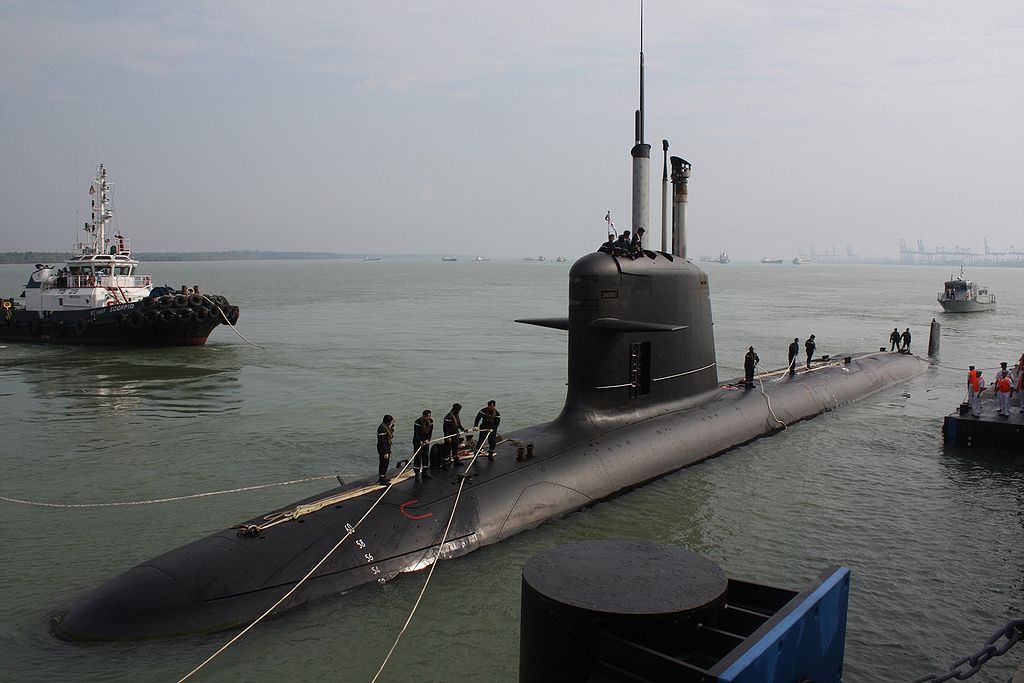
While the DCNS leak crisis shouldn’t deeply harm France’s relations with India and Australia, it has already had consequences. In particular, recent reporting that India might not go ahead with a follow-on buy of Scorpenes will be worrying the French company.
The French public shipbuilding firm has been targeted by what it describes as an act of ‘economic warfare’: an apparent cyber-attack leading to the leak of information pertaining to its Scorpene submarines built in India. In fact, The Australian revealed last week that it had access to 22,400 pages of documents that had been leaked from the company in 2011. These documents disclose the maintenance of crucial elements of the Indian submarines, such as torpedo launching systems, periscopes and communication equipment.
A former employee of DCNS is currently suspected of the leak. It is uncertain whether the company had dismissed him for misconduct while he was working in India for one of its subcontractors in charge of training the Indian Navy.
To alleviate concern, DCNS’ strategy is two-fold: firstly, to communicate widely that the leak was, in fact, not detrimental for countries operating Scorpenes and, secondly, to take legal proceedings against anyone responsible for the leak or the publication of the documents. Despite these efforts, the affair still remains an embarrassment for DCNS.
The French Ministry of Defence is directly involved in this affair. In fact, the French State owns more than 62% of DCNS’ capital . Thalès, also partly controlled by the State, owns 35% of the company. The Ministry has tried to protect the reputation of DCNS and reassure current and future buyers.
DCNS’ core strategy, supported by French and Indian authorities and relayed in French newspapers, consists in insisting how inoffensive the leak would be for the countries operating Scorpene submarines. Firstly, there is doubt over the authenticity of the documents. According to the French newspaper Le Monde (French), the documents leaked to The Australian may have mentioned the name ‘Scorpene India’, which didn’t exist on the original documents. Moreover, the documents pertain to the maintenance of the submarines and don’t give vital information on how to detect them. The submarines’ sound signature, for instance, remains secret. India’s Ministry for Defence, whose country has committed to buy six Scorpene submarines, asserted that the security of the submarines wasn’t threatened.
Parallel to its communication strategy, DCNS filed a complaint against an unknown person for breach of trust. The Paris public prosecutor has opened a preliminary investigation seeking to discover those responsible for the leak. The French firm has also successfully obtained an injunction in the Supreme Court of NSW forbidding the newspaper The Australian to further publish any part of leaked document. Because of this pressure, the newspaper has decided not to publish information about the submarines’ weapons system.
These legal and communication strategies have been mainly aimed at India and Australia. India signed a contract with DCNS in 2005 and is expecting to operate its first Scorpene submarine at the beginning of next year. The country aims to modernise its Navy and to assert its ambitions in the Indian Ocean, especially against Pakistan and China, both of which are no doubt eager to access the documents. Indian policy-makers were irritated by DCNS’ first statement that the leak could have come from India. The Indian Ministry for Defence has opened an inquiry in order to discover where this cyber-attack has come from.
There are also significant concerns in Malaysia, Chile and Brazil, countries that also operate or will operate Scorpene submarines. DCNS has worked on reassuring them as well on the security of their equipment.
Given Australia’s recent selection of the French firm for the detailed design of 12 Shortfin Barracuda submarines, worth AUD$50 billion, the timeframe of the leak isn’t surprising. Prime Minister Malcolm Turnbull has wished to reassure the Australian public opinion by explaining that Scorpenes and Shortfin Barracudas are very different submarines and that this data leak won’t weaken the security of Australia’s future submarines. The company will have to demonstrate to its Australian partners that such a leak won’t happen again and that the data pertaining to Australia’s submarines will be protected from foreign intelligence.
French foreign policy-makers have taken Australia’s concerns very seriously. France understands the submarine deal with Australia as a tangible deepening of the two countries strategic partnership for the stability of the South Pacific, where Canberra and Paris have considerable common interests.
The leak that has targeted DCNS is substantial and concerning and it constitutes a hard blow for the French shipbuilding firm. We will see over the next few months if India maintains its reported intention to curtail any further purchases and if DCNS will be penalised by this affair in its competition for submarine contracts in Poland and Norway.

